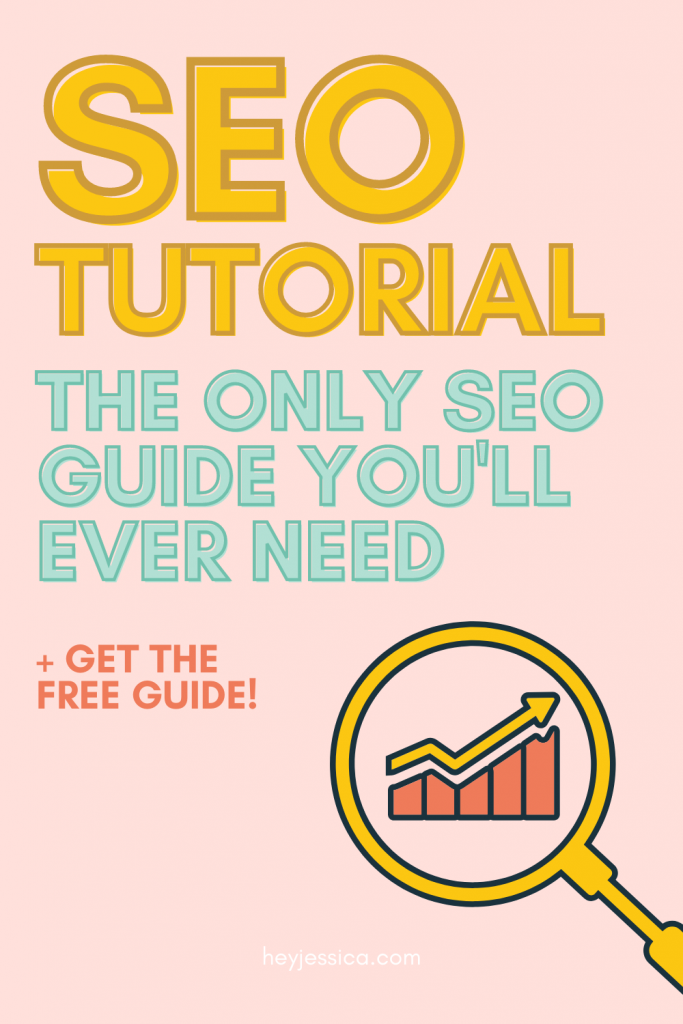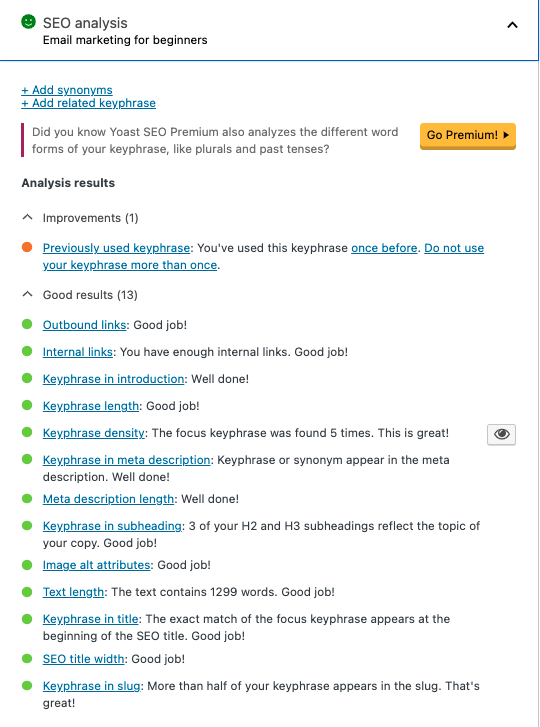It’s no secret that I LOVE content marketing. The ability to create content strategically and have it SELL for me forever is my dream. That's why I'm sharing this SEO Tutorial – AKA the only guide to SEO you'll EVER need!
SEO Tutorial | The Only Guide You'll ever need

Want to listen to the podcast version of this post? I’ve got you covered!
SEO is one of my favorite topics… which makes me feel a little nerdy, but I’ve always been that way. I really enjoy the analytical side of marketing! And that’s a lot of my job – figuring out what actually works.
I think most people understand the concept of SEO, but not the in-depth level of SEO and how it actually works. So here we are, with the SEO tutorial to make it all make sense!
What is SEO?
SEO is an acronym for search-engine optimization. That means you create content and then “optimize” it up so that it will show up whenever people search for certain keywords in a search engine. Anywhere someone can go, type in something, and be served results is a search engine. Right now, the top 3 search engines are Google, YouTube and Pinterest.
Even though we use each one differently, the SEO strategy is relatively the same for all three. Pinterest is a bit of an outlier, which we'll talk about later. If you need to find a video of something, you go to YouTube. If you’re just looking for general information, you’ll head to Google. And if you’re searching for some visual inspiration, you’re going to go to Pinterest. (There are some people who forget these exist and just ask their Facebook friends… but mostly, people are using search engines, ha.)
YOUR job as a business owner is to create content that people will discover via these search engines and bring people into your ecosystem.
Content Marketing
This requires content marketing. You create content for your ideal client/customer that you know they will love! Then, your ideal client/customer finds it via search, and then they’re able to join your ecosystem in another way. Maybe they find a blog post from you that has an opt-in embedded into it and they sign up for your email list. Or they find a YouTube video from you, subscribe, and eventually follow you on Instagram or your podcast.
The GOAL of your content is to put your business in front of the right people. And then, to get those right people down your path, nurture your relationship, and sell to them when they’re ready to buy.
SEO is just “zhuzhing” up the content you’re already creating so people can find it
You’re already going to write a blog post about some fantastic topic. So what can you do to that blog post to make it more likely to show up in search? There's actually a pretty finite set of rules that you can follow to make it happen. AKA what we're talking about in this SEO tutorial.
And following those rules is WORTH IT. The people who win at SEO will have bigger audiences and email lists, because new people will find them every single day.
If you aren’t creating content that can be found via search, you’re missing a BIG opportunity to reach your ideal client.
Search is a totally free way to get your business in front of the right people. And if you aren’t using it, you’re missing out on a massive portion of your potential audience!
If you feel like your business isn’t growing and you wish people would discover you, it’s probably because you aren’t doing this. Either you aren’t creating content for search engines at all, OR you’re not doing it consistently.
Let’s talk about consistency
Consistency is key online, period. No matter the platform, if you aren’t posting and engaging regularly, people will stop engaging with you. And consistency is important with SEO, too.
We can zhuzh up your content and sprinkle magic fairy dust on it all day long, but if you aren’t consistently putting out new content, it won’t work. Consistency is SUCH a big part of SEO. You could be doing everything else right, and if you aren’t putting out new content for search engines consistently, it won’t work.
For example, if you’re on YouTube and you’re throwing up videos randomly, you could do EVERYTHING right on all of your videos and not see the results. YouTube will not send people to your content via the algorithm without knowing that you will consistently publish more.
The hard truth is, you could do everything I tell you today and it won’t matter if you aren’t consistent. Platforms want to push out content that will keep people coming BACK to their platform. If you aren’t consistent enough to bring people back, you won’t get recommended. It’s like if your favorite TV show just randomly stopped airing new episodes for six weeks – you’d move on.
I’d say consistency is 25% of the pie, and everything else we’ll discuss makes up the other 75% (with some having more weight than others).
My secret SEO strategy to winning search
I'm starting off this SEO tutorial with the secret that always blows people’s mind.
You have an audience of a certain size. That means you only have authority in these search platforms with a certain size. (This isn’t directly tied to your audience size in this way, but for the sake of this example, it will help you understand what authority in a platform means.)
If you have a brand new website that only has a few posts and relatively few visitors each month, you have less authority than someone who has been doing this consistently for 10 years and has a bunch of articles that show up in search and get a lot of visitors. In Google, this is called your “Alexa” ranking (no idea why).
You can download a Chrome extension called “Alexa Traffic Rank” that will allow you to see the ranking of any website you’re on (including your own – which is the purpose of it). It can be a useful tool to check someone else’s website if they want to add a backlink to YOUR site, though. A backlink is a link to your site in their website’s content. If their ranking is higher than yours, a backlink will improve your authority.
That’s why getting an article written about you on a site like Forbes is such a big deal for entrepreneurs. There’s a lot of authority that comes with that, including online authority! If they link to your site, you’ll get some good juju from their Google rankings added to yours.
Each search engine has a ranking system
The individual ranking systems determine your authority in search. If you have 30 visitors per month, you have less authority on that platform than someone who has 30,000 visitors per month.
The same goes for Youtube. If you have 1,000 subscribers, you have less authority than someone with 100,000 subscribers but more than someone with 50 subscribers.
On Pinterest, it’s all about your monthly viewers. More monthly viewers means a higher authority, less monthly viewers means a lower authority.
Remember, those are the top 3 search engines. And if you want to win at SEO, knowing those numbers gives you insight into HOW you can win. It’s about more than just putting out content and hoping for the best (but you know that, which is why you're reading this SEO tutorial, right?).
You have to work within your OWN authority on the platform
In other words, you can’t get “too big for your britches.”
If you have 50 subscribers on YouTube, you can’t go after the same search terms as someone with 100,000 subscribers. You HAVE to work within your authority on the platform.
First, I want you to sign up for a service called Keywords Everywhere. It is paid now, but it’s inexpensive – and it is SO important. Install the Chrome extension because it’s necessary.
Once that’s installed, you can go to Google and type in a keyword that you want to be found for.
Keywords are NOT one word or a hashtags. Generally, they will be a long-tail keyword, or a phrase, that someone will search who would want to find your content. If you’re doing a tutorial on ClickUp, you won’t rank for “ClickUp” – you’ll try to rank for “how to use ClickUp” or “ClickUp tutorial 2021.”
Once you search for that phrase, 3 numbers will appear. The first one is the amount of searches per month for that key phrase. Then how much it would cost you if you paid per click to target that key phrase. And the third one is the competition.
Let's ignore the last two numbers for the sake of this SEO tutorial. Work within the parameter of the number of searches per month.

Base your keyword strategy on your authority on the platform.
If you’re brand new and get 10 visitors per month, you can’t go after a keyword with 2 million searches per month. I have a decent website ranking and 118,000 YouTube subscribers, and I can’t go after a term with 2 million searches per month.
Keep that searches per month number in perspective of your authority. I try to keep those numbers very close to each other. If you have 100 visitors to your site per month, try and stick to key terms that get close to 100 searches per month. Same goes for YouTube subscribers as compared to searches per month.
How do you actually do that?
So, you have 1,000 website visitors per month. That means you should look for key phrases with close to 1,000 monthly searches. But how do you do that?
Start with a more general keyword that you want to write about. See how many searches that word has, and go from there. “SEO” has 2.4 million searches per month, but maybe “how to do SEO” gets way less. Play around with it and see what works!
You can also add a space and an underscore before the phrase you just typed to see more options. Rather than getting suggested key terms that start with SEO, the “ _” would show key terms with SEO in the middle. Meaning more options!
Maybe I select the key term “Yoast SEO.” How do I get my blog post found for that term?
Use Yoast SEO as a tool to optimize your blog posts for your key terms
If you use WordPress, one of the best tools I'll mention in this SEO tutorial is a tool like Yoast SEO. (Funny, right?)
A sidebar here – if SEO is important to you for your website, then self-hosted WordPress will perform the best. You will outrank people using Squarespace or Shopify because those platforms don’t hold as much weight with Google.
All website platforms will give you a space to tell them what keywords you want your content to be found for. And Yoast is a GREAT tool to do this!
Yoast is a plugin for WordPress. It allows you to put in a key term that you’d like to be found for and uses a red light, green light system to tell you if you’re good to go. It calculates the red light or green light based on a lot of factors (that it lists for you) that will determine your ranking on that page.
Yoast makes it easy zhuzh up your content for search engines, because they have about 20 different markers that they want you to optimize so you can get found.
Yoast only works on WordPress, so on other platforms it’s a bit more difficult. BUT SEO isn’t rocket science, and it isn't the reason you get found. It’s just a system that shows you whether you’ve done a good or bad job optimizing that content for SEO. So you can take what it teaches to any platform!
You can Google the Yoast SEO criteria to see what these are. I’ve also included a screenshot of an example from the Hey Jessica website below! The more of those markers you hit, the higher that blog post will perform in Google.

One that Yoast doesn’t include is YouTube videos in your posts. If you have a blog post with a key phrase and a YouTube video with that same key phrase in the title, embedding the video in your post will give you a higher ranking.
What about SEO strategy on YouTube?
Yoast does not exist on YouTube, but there IS a tool called TubeBuddy that serves a very similar function! It will help you do keyword research, see if you have all the criteria you need in place, and make your life way easier.
Does podcasting work the same way?
No, not exactly.
You can totally rank in the podcast platform’s search for your episodes. But it is MUCH harder to “hack” that system. The user behavior of people searching in a podcast platform is very different. In Google or YouTube, you’re saying “how to change your oil.” On podcast platforms, most people search using one to three words. So it’s much more difficult to rank.
If you’re doing a podcast and want people to find you because of it, you HAVE to be doing blog posts to accompany them. Give the blog post good SEO, embed your podcast in it, and people will be much more likely to discover you.
And what about Pinterest?
The difference between Pinterest and Google/YouTube is that you physically have to TELL Pinterest you put out content. If you publish a blog post, Google automatically includes it in search results. Same for YouTube. But on Pinterest, if you don’t create a pin for that content, you’ll never show up in that search engine.
Make a graphic, tell Pinterest what that content is about, and link it. Physically tell Pinterest that you have the content and you’re good to go!
Whew, that was a LOT of information! But I PROMISE that this SEO tutorial has all the things you need to make your website rock SEO. And don't forget to grab my FREE SEO Guide below so you can have all the tips and tricks you just learned in one place 🙂
+ show Comments
- Hide Comments
add a comment